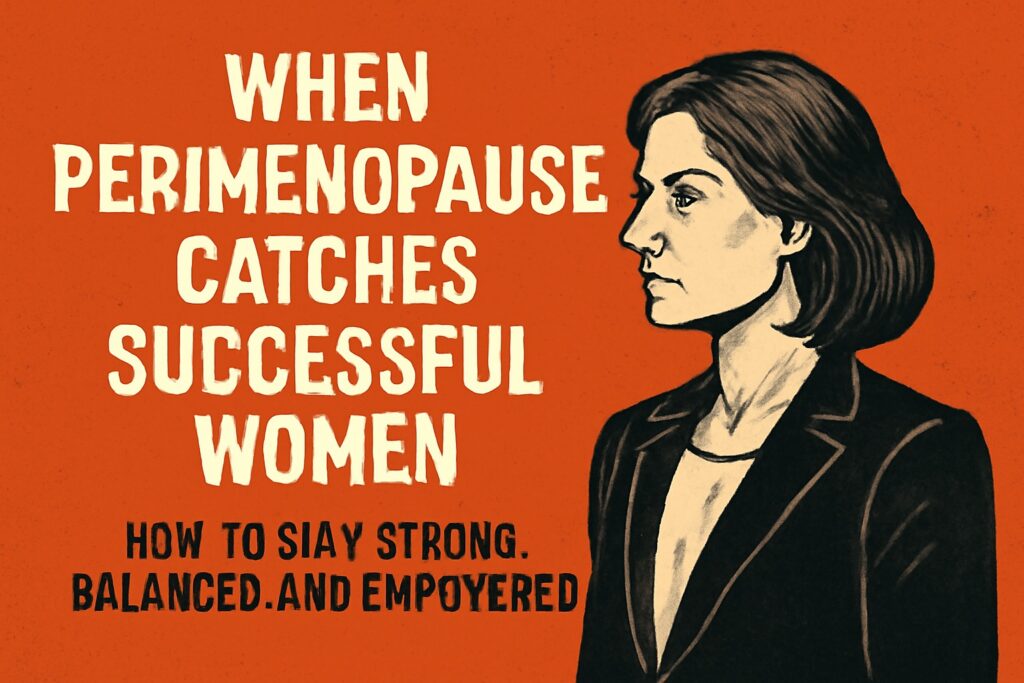1. Introduction: The Silent Shift
Perimenopause is a progressive transition, but for many high-achievers women, it arrives surprisingly—right in the middle of their most productive years. When it occurs, it’s greater than just a health alter; it feels the same as an identity change. This part doesn’t care how achieved you are or how thoroughly you’ve built your career—perimenopause can catch successful women right off guard.
2. What Exactly Is Perimenopause?
Perimenopause is the period before critical when hormonal—especillay estrogen and progesterone—begin oscillating. It can kick off as soon as your late 30s or ahead of time 40s and basically lasts many years. During this time, women may experience:
- Irregular periods
- Hot flashes
- Mood changes
- Brain fog
- Sleep disturbances
Unlike climacteric which is described by 1 Year absence of menstruation, perimenopause is a progressive change—and it’s sometimes the most perplexing part.
3. Why It Hits High-Achievers Differently
You’d anticipate women at the number one of their professions to be in hand. But perimenopause catches successful women at the most untimely moment—when they’re guiding teams, handling businesses, and balancing family life. The unseen manifestation (like concern, fatigue, or out of focus) can subtly influence their performance, and many don’t even comprehensive its hormones at first.
Unique Insight:
Most commercial well-being initiatives ignore climacteric management. As a conclusion,most women feel like they’re quietly battling while trying to manage an image of power.
4. The Hidden Cost: Emotional and Mental Load
What makes this phase harder is not just the symptoms, but the pressure to “power through.” Ambitious women are usually used to fixing problems quickly. But the climacteric period doesn’t work that way—it’s careless, unmatchable, and emotional.
Symptoms like:
- Unexpected anger or crossness
- Feeling stunned
- Low self-morale
can be self-concern, specifically in high-reliability acts.
5. Physical Challenges in a Fast-Paced Life
Managing a timeline while negotiating with nocturnal hyperhidrosis or sleep deprivation isn’t effortless. Weight gain, joint aches, and loss of stamina can also compromise performance.
Here’s what can help:
- Flexible work timetable
- Open discussions with leadership
- Creating space for physical self-care
6. Staying in Control: Hormonal Support and Smart Choices
A few women want pharmaceuticals but acknowledging your choices is key.
- (HRT): For not all, it’s transformative.
- Organic compliment: Like black cohosh, ashwagandha, or magnesium.
- Functional nutrition: Controlling blood sugar and decreasing caffeine can learn mood swings.
Pro tip: Keep a daily symptom tracker. This helps you spot patterns and advocate better during doctor visits.
7. Maintain the Body, Save the Mind
Your body needs the fuel to stay strong-especially during climatic periods.Suddenly changes influence all things from mood to power, so what you eat matters as never before.
Eat more of:
- Omega-3s
- Leafy greens
- Fermented foods
Cut back on:
- Processed sugar
- Excess caffeine
Clear options make a major distinction. Maintain your body, it’s the basis of your strength.
8. Fitness That Fits a Busy Life
You don’t need hours in the gym. What matters is constancy.
- Powerful training: Increases bone solidity and balances hormone
- Yoga or pilates: Decreases corticoid and helps with full focus
- Walking: Easy, flexible, and great for heart health
Create something into your daily work without any kind of pressure. Only between 15–20 minutes daily makes a separate.
9. Brain Fog and Focus Fixes
If you forget a word mid-presentation or lose your train of thought—you’re not alone. It’s hormonal, not a failure.
Tips:
- Keep a notebook or voice recorder
- Take “micro breaks” during work
- Try brain supplements like omega-3s, B-complex, or ginkgo
Mental sharpness returns, but be patient with yourself.
10. How Real Women Cope—and Win
When perimenopause catches successful women, they respond in remarkable ways:
- One CEO built a wellness policy at her company after realizing half her team was silently struggling.
- A tech founder started a podcast about midlife strength after being misdiagnosed with depression.
- A lawyer modified her daily routine, never working only weekends, and said, “I eventually learned to manage myself, not just others.”
These tales show strength, not weakness.
11. Redefining Success Post-40
Perimenopause isn’t the end of productivity—it’s the beginning of working smarter.
This time of change is also:
- A wake-up call for better self-care
- A moment to set healthier boundaries
- An invitation to redefine power and presence
You’re not slowing down. You’re evolving.
12. Final Words: Embrace the Change
If perimenopause catches successful women, it’s not because they’re weak. It’s for the reason that the system nevermore taught them what to expect. Now that you’re conscious, you can face it with belief and trust. You’re not leaving your edge—you’re going into a deeper kind of power.
FAQs
Q1: At what age does perimenopause begin?
Normally between 38 to 45, but it differs.
Q2: Can I still move in my job during perimenopause?
Yes! Most women bloom once they comprehend how to handle symptoms.
Q3: Are organic remedies adequate?
For some, yes. Those else may require HRT. Talk with a doctor who is an expert in women’s health care.
Q4: What if my workplace doesn’t understand?
Start by educating your HR. Many companies are now open to menopause awareness training.
Q5: How long does perimenopause last?
On average, 4–8 years. It ends when you’ve had 12 months without a period (menopause).


